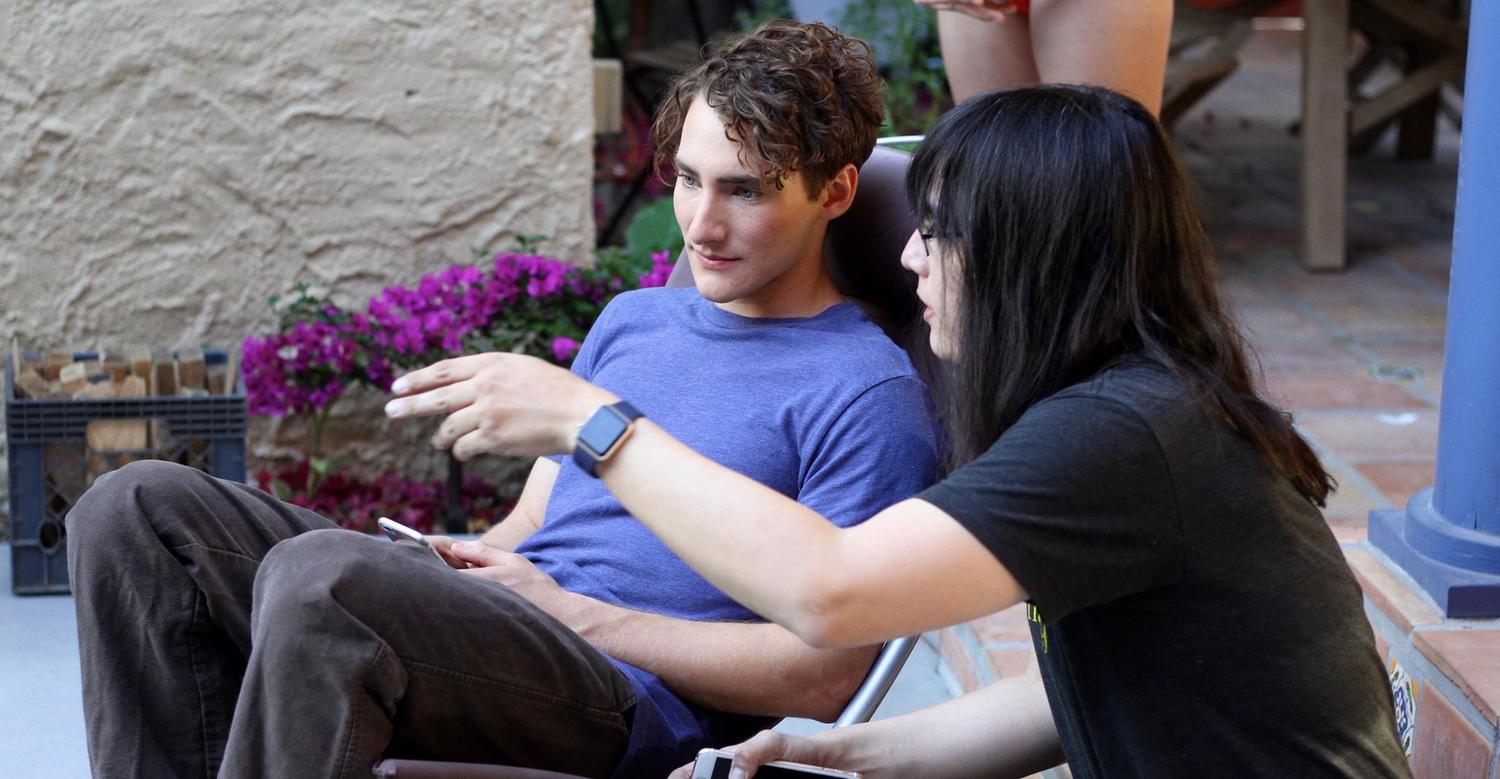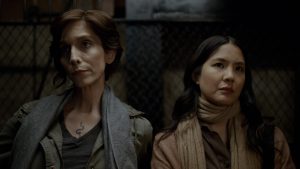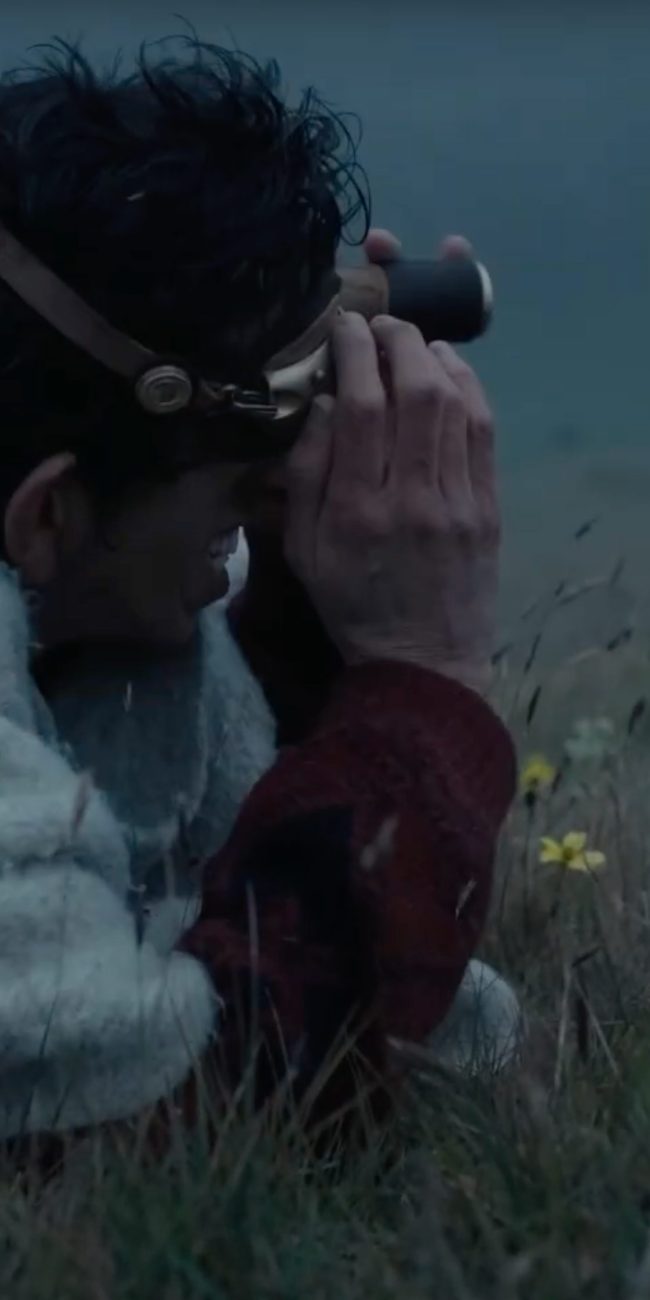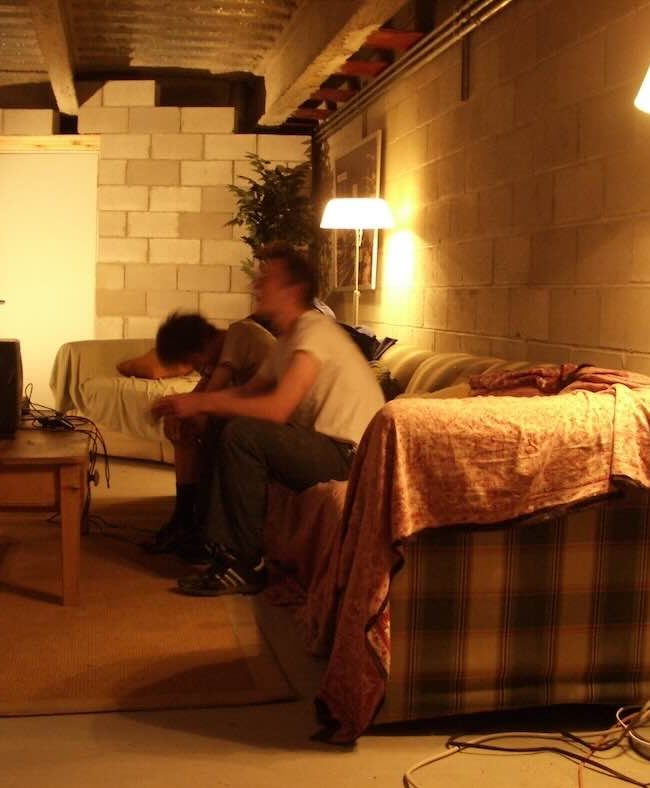A Conversation with Mari Walker, Pooya Mohseni & Lynn Chen (SEE YOU THEN)

Mari Walker’s See You Then may be the first truly authentic transgender Narrative Feature. Making its world premiere at SXSW, the melancholic romance about the reconnection of two lovers, fourteen years after one of them left without a word and transitioned. Unlike other films that have broken ground telling transgender storylines, Walker’s feature directing debut presents a transgender character played by a transgender actor directed by a transgender director. Sounds simple, but I can’t find any other circumstance of it happening, certainly not at a major festival. Oh and when Walker and Pooya Mohseni sat down with me, a transgender film critic, we must have made history again! Throw in Lynn Chen who made her debut in Saving Face, and you’ve got one of my favorite interviews I’ve ever done.
The film itself is simple. Naomi agrees to meet Kris for dinner, and as the evening progresses, she rediscovers the person she thought she knew years before, or rather truly meets for the first time. It’s not an easy meeting. As much as the history they share, there is the undercurrent of the unspoken just below the surface all night long. For someone transgender, See You Then captures the tiny microexpressions and microaggressions we experience from every angle, from friend and stranger like. For me, the whole thing was pretty triggering.
Hammer to Nail: I feel like your film, Mari, is a primer for Cispeople. This is what you need to know. You’re going to have a conversation that goes this bad. So maybe, learn something from watching it on screen, so you could do better. You’d be a step ahead.
Mari Walker: Hi. Yeah, I hope so. The film was imbued with a sense of universal truth that even though these were very specific stories told about specific individuals that they still carry those themes of regret, and looking at a past lives, and trying to reevaluate where you came from and who you are now. And, with any hope, it will be able to be seen from people of all ilks, all across the world, and they can find that relation to it.
HtN: Was there a particular person you had a re-meet with years later that inspired this, or is it a series of conversations?
MW: It was mostly developed out of a series of conversations with my co-writer and our producer, Kristen Uno, and some of my other friends trying to define womanhood for myself and the expectations and things that I had sort of put on myself as to what I felt I needed to accomplish to be successful on my own metrics. It’s that great process where you’re writing, you’re writing. And then all of a sudden, a line will sort of come up out of nowhere, and it will be the authentic line.
HtN: Was there a particular line? Was there a moment when it became, “Oh, I’m not just putting together my own experiences. I now have this character, which is not me.”
MW: I think it was around the scene at the house more towards like the three quarters point of the film. A lot of that dialogue started to just sort of manifest itself. I mean, it was, a conversation Kristen and I would rewrite and speak the dialogue to each other as we were writing. And Kristen said that she knew that the writing was at a good point when we would read the lines to each other, and I got to a place where I was so emotional playing Kris that I just started yelling at her as the character.
HtN: What was the first thing you thought to put out there? What was the first scene you had in mind?
MW: Oh, that’s a really good question. That’s a really good question. The first scene, I think it was very linear. I think it started with the outside. I’m in the parking lot, and we worked our way in. I had had this dream of being given the opportunity to shoot outside at night. And then, my producers told me that I’m insane, and that I need to actually shoot the stuff inside so that we can control the light. And I was like, “That seems fair. Sure!” I think I really desired to tell a chamber piece, learning how to direct actors and also learning how to write dialogue, which I felt like wasn’t my strength heading into this because I had mostly been doing documentary work.
HtN: So instead, you decided to do a film that’s all dialogue.
MW: Yeah, exactly. And all at night, this is a great idea.
HtN: So Pooya, what was it like to read the script and know that you were going to become the vessel for this conversation, and that vessel for whatever Mari was sort of working out originally when she was writing?
PM: I remember the first time I read it, and Mari probably has an email somewhere that said the first time I read it, I was gasping for air. When it came to certain parts: when you were talking about triggering. Well, as a trans person, I’m reading this. And I’m, “yeah, yeah. Okay. Yeah.” And I don’t know if I was triggered, but I could feel viscerally the pain of this character, what they felt that they had missed out on, what they wanted the things that they had to. And I think the most difficult part having to come to terms with the fact that things that you’ve wanted; you now have to come to terms with the fact that it’s not going to happen. And lost life, trying to find yourself whether it’s in a bottle or relationships that aren’t good enough as a trans person.

A still from SEE YOU THEN
HtN: I will say that I had to watch the film twice because the first time I watched it, I just basically cried through most of it. And so then, I had to go back and rewatch it for content. Also, halfway through it, I started to compose an email to ex-girlfriend of mine. Like “I really feel you need to see this movie that you can’t see yet.” There were so many things. The moment when Naomi says to Kris: “You were the most tender relationship I ever had,” That was what was said to me. Exactly. Like those exact words were something said to me by my ex-girlfriend colleague. And “this makes so much more sense now.”. And then, the other line that really hit me hard was when Kris said, “You have to understand I didn’t start living until 14 years ago.”, which I say to my wife kind of almost every day.
PM: When I’m reading through it, I felt myself going “Oh my God! I want to know what character says on the next page. And it’s crying as I’m reading it and gasping for air and having to put it aside because I’m sobbing. And I can’t see through my tears. And I was, “Yes, I want to do this.” I knew that this character was a beautiful representation of a trans person that, as you also know, isn’t out there readily. And I felt it was a privilege and a responsibility to carry that role.
HtN: Okay, so Lynn, I’m sorry to ask you this question this way: how does it feel like basically being the cis-gender villain?
Lynn Chen: I feel it’s an enormous gift that Mari trusted me to say these words, and that she had the bravery to just allow for that ugliness to come out, but in a very nuanced way, because at this point, no, I don’t want to give any spoilers, but, at this point, we know this character pretty well, and we know her flaws.
HtN: Right, and she’s not all bad.
LC: As a CIS woman, who studied feminist studies and gender studies in college, but a long time ago, and an ally to the community since I did Saving Face 15 years ago, which was the first lesbian movie with Asian-American leads. And I felt ‘there’s just still so much I don’t know. There’s still so much I’m curious about. There’s still so much to learn.’ And so knowing that I can be the person even if I say some pretty hurtful things, some pretty horrible things that I, Lynn, as the actor, ‘I don’t want to say these things,’ but knowing in naming this and seeing the reaction that Kris has, that is going to help people understand and relate and change minds. Not change mind but understand, have empathy, and just be able to humanize in a way that only film can; in the way only seeing somebody express a thought that you might have, that you can then reconsider and think, “Oh, that is actually wrong.”…I’m just honored to be a part of that.
MW: I really at the end wanted somebody who might not be as relationally positive to the trans community to feel for Kris, and then somebody to feel for Naomi and to be at combat with those experiences of saying, ‘Well, this person said this and this was wrong,’ but then this person said this, and this is wrong. Or they made this choice, and that was wrong. Or they made this choice. And I really wanted it to be sort of like this push and pull between the two characters and allow the audiences hopefully, at the end, certainly had an opinion of who they feel is right or wrong.
PM: I think as people, we look back at certain moments in our lives, and we have a perception of what that moment meant in our lives. How it could have gone differently? What did we lose? What did we do wrong? And the guilt. And I feel that Kris definitely feels that she did something that she’s not proud of. And that the way that she did it, she does not feel proud of. And she wants to explain, hoping to let go of the guilt but I think what happens is they both are forced to look at their lives as it is, not as it could have been, not as it should have been, but as it is.
MW: I think that Kris also suffers from something I think a lot of. And I think I’ve seen for other, some other trans folks, is that it’s a people-pleasing perception. We all want to be accepted. We all want to be loved. We want to be looked at as people, not as objects, not as fetish visualizations. And I think that part of Kris’s journey through the film as well.
HtN: What else is the cisgender audience not going to understand in this film, Mari? What will they never truly appreciate that we do that you want to tell them they should really pay attention to? Because there’s so many micro moments filmed with such attention paid to other people’s physical presence and behavior – what happens when a hand is near and how you compare that to what it would have been 14 years ago. Also, how that behavior changes over the evening, the constant reassessing of a relationship I thought really rung true to me.
MW: I…Thank you. I think some of those more private, smaller moments might be a little lost. Some of it I think kind of is that nuance of understanding people in bold characters in both communities; I’ve been encouraged. I, some of the reactions we’ve gotten from the cisgendered folks in saying that they have, ‘I’ve never seen anything quite like this, I feel I understand a little bit better, sort of what those experiences are like.’ And there’s a very heartening to me because we, in people and in these various cities, are experiencing every day, but most cis-gendered folks don’t spend a lot of time thinking about those things, which is fair. But when you’re confronted, hopefully, it will give them an opportunity to sort of look inside themselves and say, ‘Well, how do I feel myself? And why am I letting these definitions control how I feel?’
HtN: There’s a really lovely moment in the movie where she talks about having looked at the world from a male point of view and having looked at the world from a female point of view; I could tell you that is the gift. And I don’t think people realize that that. There is a perspective that is incredibly unique, and it should really be valued.
MW: That’s the gift of transitioning. It gives you that additional field of vision that other people just don’t possess. And I think that’s a gift. It’s a hard gift sometimes to receive, but it’s also a beautiful gift.
HtN: People don’t take advantage enough, but like every year, every interview about every topic should be given to people who are trans because we have two perspectives on everything.
PM: I always say we’re like the ambassadors of gender.
HtN: Love it.
MW: Yeah, absolutely.
– Bears Rebecca Fonté (@BearsFonte)











